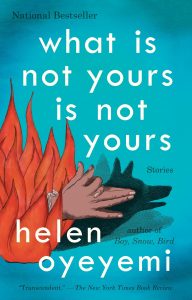 My first inclination was to have !!! stand-in for my thoughts on this book. Exclamation marks are about as coherent as I’m likely to get when it comes to Helen Oyeyemi’s work. (Have you read her? If not, I’ll gladly wait here while you place a hold on any one of her books. (And if deciding is proving troublesome, Mr. Fox is another personal favorite.)) If I could read a new Oyeyemi book every year that would be the cake, the icing, and the bunch of brilliant sparklers on top. Her writing is that evocative. Her plotting is that interesting and thought-provoking. Her characters are each and every one of them so intriguing and richly drawn.
My first inclination was to have !!! stand-in for my thoughts on this book. Exclamation marks are about as coherent as I’m likely to get when it comes to Helen Oyeyemi’s work. (Have you read her? If not, I’ll gladly wait here while you place a hold on any one of her books. (And if deciding is proving troublesome, Mr. Fox is another personal favorite.)) If I could read a new Oyeyemi book every year that would be the cake, the icing, and the bunch of brilliant sparklers on top. Her writing is that evocative. Her plotting is that interesting and thought-provoking. Her characters are each and every one of them so intriguing and richly drawn.
While What Is Not Yours Is Not Yours is technically a set of stories, each one contains unifying elements: Keys and characters wind thread-like through the collection. I’m hesitant to say how, because encountering these things as you go is almost a literal thrill. When you recognize what Oyeyemi has done—Or, no, I’ll speak for myself: When I recognize what she’s done my response is the kind of indrawn breath that is taken in the presence of magic and striking sunsets and elaborate, decadent desserts.
So I’ll add to !!! with: This is a wholehearted recommendation, and not just for What Is Not Yours, but for all of her books.
****
I’m fond of certain insights, of knowing what struck the match on a particular piece of fiction, and so will go over the internet with a comb and tiring eyes for any hint. In the case of What Is Not Yours, Oyeyemi made mention of it in an NPR interview: She was traveling through Cairo, where most shops, she noticed, sold swords and keys. As keys were the easier option to collect and carry away, she did just that.
On whether a key is as dangerous as a sword
There is a strange way in which that is true. I think keys can cut — it divides property, it separates what is yours from what is not yours. A key defends what you have, but it also protects other people’s property from you.
In trying to write a story about keys, you find yourself unable to write about the key directly, but you sort of make all of the leaps that a key makes — you sort of tumble.
About the book:
“Playful, ambitious, and exquisitely imagined, What Is Not Yours Is Not Yours is cleverly built around the idea of keys, literal and metaphorical. The key to a house, the key to a heart, the key to a secret—Oyeyemi’s keys not only unlock elements of her characters’ lives, they promise further labyrinths on the other side. In “Books and Roses” one special key opens a library, a garden, and clues to at least two lovers’ fates. In “Is Your Blood as Red as This?” an unlikely key opens the heart of a student at a puppeteering school. “‘Sorry’ Doesn’t Sweeten Her Tea” involves a “house of locks,” where doors can be closed only with a key—with surprising, unobservable developments. And in “If a Book Is Locked There’s Probably a Good Reason for That Don’t You Think,” a key keeps a mystical diary locked (for good reason).
Oyeyemi’s tales span multiple times and landscapes as they tease boundaries between coexisting realities. Is a key a gate, a gift, or an invitation? What Is Not Yours Is Not Yours captivates as it explores the many possible answers.”


